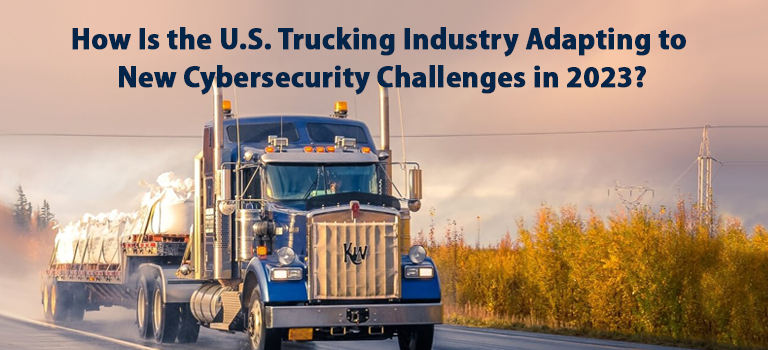The trucking industry is crucial in the U.S. and worldwide. Millions of truckers hit the road to provide essential goods and services for people daily. However, like other industries, the sector is vulnerable to cyber threats and attacks.
In the digital age, cyber theft and attacks have evolved. Transportation and logistics companies have had to rethink their cybersecurity strategies. What challenges do they face now and in the future? How are they adapting? This article outlines how the industry is adapting to modern challenges.
What Are the Trucking Industry’s Modern Cybersecurity Challenges?
Cybersecurity has been a growing problem for the trucking industry for over a decade. Today’s interconnected supply chain has presented new challenges for fleet managers in 2023. Here are the issues trucking companies face today.
1. Increased Cyber Theft
Cyber theft has significantly increased since the pandemic. Numerous industries like health care, education and government have seen spikes in cyber threats. The transportation industry also suffered from surges. For example, between June 2020 and June 2021, transportation companies saw a 186% increase in ransomware attack attempts.
The trucking industry is vulnerable to cyber theft because of its role in the global economy. Cybercriminals know these fleets are at the heart of supply chains, making them a bigger target. The increase has made trucking companies allocate more resources toward cybersecurity.
2. Phishing Attacks
Some old tactics are still around with modern technology. Cybercriminals have used phishing attacks since the 1990s. They send emails with links and attachments containing malware. The user opens the email and clicks one of the bad links, giving the thieves unauthorized access to the company’s systems. Cybercriminals then gain access to sensitive information like customer data and financial records.
Despite their age, phishing attacks remain the most common tactic for cybercriminals to steal information. Thieves are becoming savvier with phishing attacks by spoofing other users — such as clients, vendors, shareholders, and other important figures.
3. Evolving Cyber-Attacks
Phishing attacks open the door for cybercriminals to launch larger schemes. For example, in 2017, phishing emails set the stage for the Petya and NotPetya attacks. These viruses attacked numerous organizations worldwide, including some in the transportation industry. The attack ended up as one of the costliest cyber-attacks in history — totaling about $10 billion in damage.
These attacks demonstrate how cyber-attacks have evolved. In the last decade, thieves have become more sophisticated in their attacks. The trucking industry must be vigilant of attacks at every corner. For example, truckers can face cyber theft inside their truck with electronic devices or outside the big rig when they use credit cards at the gas station.
How Is the Trucking Industry Adapting?
Nowadays, cybersecurity has become a top priority for trucking companies. Operating without it leaves businesses vulnerable to any hacking group worldwide. Here are X ways the trucking industry has adapted to modern cyber challenges.
1. Cyber Insurance
A trucking company can use every antitheft software and device on the market. Still, it can find itself vulnerable to cyber theft. Modern cybercriminals are savvy enough to circumvent firewalls and gain unauthorized access. One way logistics professionals can protect themselves is with cyber insurance.
Cyber insurance is essential for trucking companies in the digital age. This insurance assists businesses with the financial fallout from cyber theft. These attacks could lead to lost data, legal fees, regulatory fines and more. Employing cyber insurance has become crucial in building trust with clients, partners and shareholders.
One obstacle to cyber and other insurance types is the cost. Research shows insurance premiums rose 47% between 2009 and 2018 due to high litigation payouts. Trucking companies can expect to pay about $150 monthly for cyber insurance, depending on the coverage they want.
2. Network Segmentation
Many transportation companies have streamlined their processes into single databases. Fleet owners can see vendor payments, communications, and other data in one system. Streamlining has made operations easier but also more vulnerable. Cybercriminals accessing the system now can see everything. This liability has led fleet managers to utilize network segmentation.
This process entails dividing a single network into smaller chunks. Network segmentation allows cybersecurity experts to isolate a network section if they identify suspicious activity. The IT department only has to shut down a specific part of the network instead of creating downtime for everybody.
3. Cybersecurity Training
Cybersecurity starts with the truckers themselves. Training all employees on best practices is an excellent deterrent to cyber theft. Modern cybercriminals have become more sophisticated, so it’s essential to teach and reteach truckers how to protect themselves and their trucks moving forward.
Logistics leaders may create a cybersecurity training seminar for their employees or utilize a third-party to teach the workers. Many trucking companies ask their IT departments to train and test their employees on cybersecurity. For example, they could send truckers a suspicious email to see their response. IT leaders should teach their colleagues to flag these attempted hacks.
What Challenges Will the Trucking Industry Face in the Future?
The cybersecurity industry is forever evolving, leading to high demand for these experts in the trucking industry and beyond. The Bureau of Labor Statistics (BLS) says the information security field will grow by 35% this decade. Logistics companies will need them as autonomous trucks become more prevalent.
Self-driving trucks rely on vehicle-to-vehicle connectivity to stay safe on the road. Cybercriminals can exploit their vulnerabilities and cause headaches for trucking companies. Logistics professionals must stay on top of software codes and cybersecurity protections to ensure their trucks aren’t vulnerable to thieves. Remote monitoring will be crucial in ensuring their safety.
Maintaining Critical Cybersecurity Infrastructures
The trucking industry is essential to the global economy. Nations worldwide rely on these workers to supply food, goods, and services across the supply chain. High importance means a high regard for threats. In the digital age, it’s cybersecurity. The trucking industry must continue evolving as new cyber threats arise.
Oscar Collins
Tags: Cyber Threats, NotPetya, Transportation



